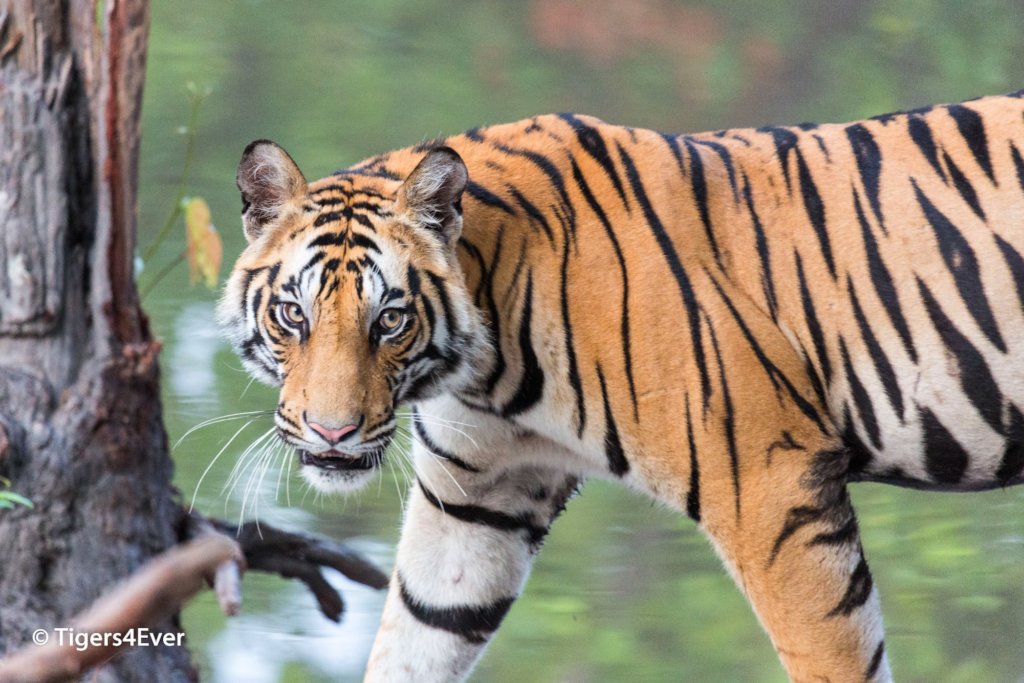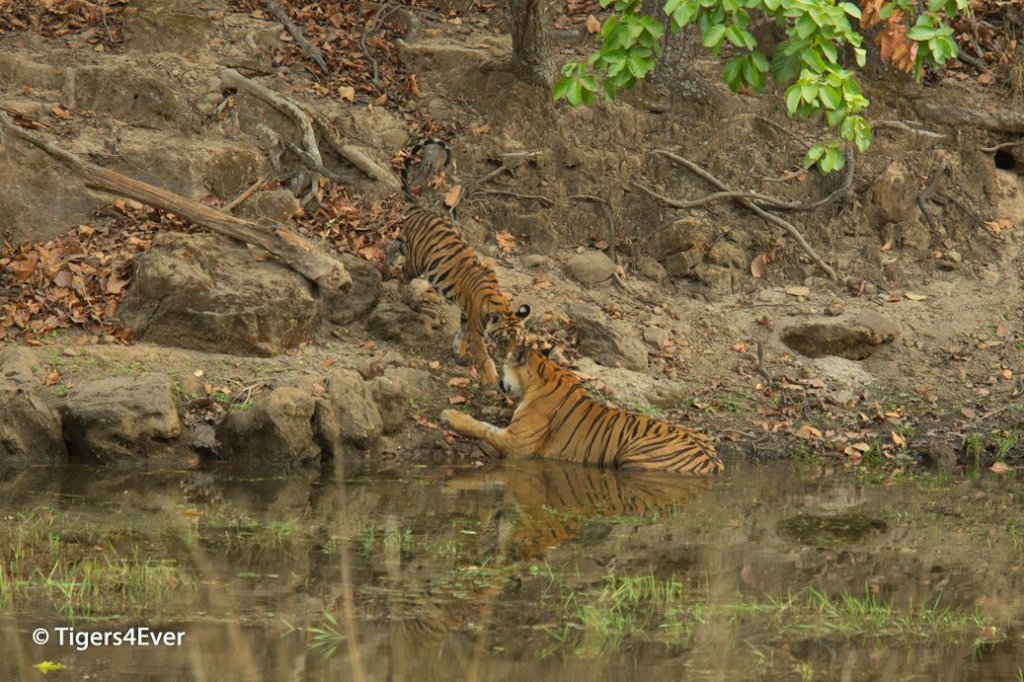By Dr. Corinne Taylor-Smith | Project Leader
The hot dry season came to an abrupt end in the last week of June, with the first sustained deluge of rainfall which signified the onset of the 2019 monsoon season. It brought some much needed respite from the searing heat and high humidity which had made conditions extremely difficult for all since the end of May. With the rains came the inevitable thunderstorms and trees being felled with periodic regularity by lightning. This is quite a dangerous time for our patrollers, not just because the onset of the monsoon brings with it the start of peak poaching season, but because of the dangerous weather conditions in which our patrollers work. It is not uncommon for rivers and streams to break their banks with the sudden rapid swell which can occur within minutes of the rain starting. We have seen first-hand how a dry river or dusty road can become fast flowing rapids within as little as 10 minutes. Cyclists literally have to dismount and carry their bikes above their heads as they wade through thigh deep water. It is not uncommon for even the four-wheel drive jeeps, used for transport by our anti-poaching patrol teams, to aquaplane in the mud. Visibility is also dramatically reduced during the rains to little more than a few feet (<1 metre), which means that our patrollers must be permanently on high alert for a whole spectrum of dangers.
Miscreant activity always increases during the monsoon rains too, this is partly due to the difficulties patrollers have covering the same distances in the usual time (due to difficult conditions) and partly due to the fact that they think that they less likely to be caught because their footprints are washed away by the heavy rains. It is for these reasons that we ideally like to double our patrolling during the monsoon period, but this is of course only possible if we have funds to cover the extra patrolling. With double patrolling we can cover greater areas to ensure that we are protecting all the areas where Bandhavgarh’s 100+ tigers need to roam freely and safely. Despite a big push to raise funds in the lead up to the monsoon period, and a 50% reduction in patrolling for May and June, to ensure that we could afford to patrol during the monsoon months we have only been able to increase our patrolling by 66% during July.
The 29 July (Global Tiger Day) brought the confirmation of the news we had been anticipating for some time (we already knew that Bandhavgarh’s wild tiger numbers have almost doubled) that wild tiger numbers across the whole of India are up by 33% bring the total number of tigers to 2967 from 2226 at the 2014 census. This increase means that there are inevitably more tigers wandering further afield in search of new territories to call their own. The incidence of tiger-tiger conflict is becoming a more frequent occurrence and in order to sustain these wild tiger numbers many things need to happen and quickly. Firstly, the destruction of wildlife habitat must stop immediately: our patrollers play a key role in this by apprehending miscreants in the forest who are illegally grazing their livestock; woodcutting; logging or stealing areas of land to claim for agriculture. This is a first line defence and is widely acknowledged as a major contributor to the recovery of wild tiger populations. On a larger scale we need to put the case for the tigers to politicians who make decisions to destroy wildlife habitat for industrial schemes and projects. Coal mining is still carried out on a large scale in India and many mines impact wildlife (including tiger) habitat due to open cast mines and the building of roads and railways to move the harvested coal. We must state the case for cleaner greener energy alternatives and the climate protective aspects of planting more trees instead of chopping down the existing forests. India is all too aware of the devastating effects of extreme weather with cyclone Fani sweeping through the heart of India just a few months ago whilst Kaziranga in Assam is currently under a metre (39 inches) of water for the second successive year with hundreds of animals including wild tigers drowned. We now must make the politicians see the true value of nature including wild tigers before it is really too late. Finally, we are looking at projects which have a direct impact on human-tiger and tiger-tiger conflict, like our waterhole project: https://goto.gg/34315 where we have an ambitious aim to raise the remaining £8810 (US$11805) by October 2019 so that we can increase the number of locations with permanent year round water for wildlife and thus enable animals to manage with smaller territories. Alongside this project, we are currently evaluating tree planting programmes to help recover tiger habitat lost to fires and illegal logging. We will also look to other organisations with similar goals to see if it is possible to jointly plant safe wildlife corridors to enhance the survival chances of sub-adult male tigers which disperse in search of new territories and females to mate.
Back to the now: As the monsoon rains continue to fall, it is bringing much needed life to the parched forest with new leaves and grasses in abundance. The monsoon season also brings a rise in activity in other parts of the forest with poisonous snakes and biting insects at their height of activity. A conversation with the Field Director a short time ago revealed that this period is one of the most dangerous for forest department patrollers as around 20 each year die from snake bites. Scorpions are also highly active during the monsoon rains and patrollers need to be extra vigilant especially when performing foot patrols. A few years ago, we tried to obtain snake-proofed socks for the patrollers but we couldn’t find a supplier who had any which were not made in China and would be suitable for use in the Indian jungle, the search goes on. In the meantime, all Tigers4Ever patrollers are trained in what to do if they encounter a snake or scorpion; we provide an emergency medical fund in case anyone is bitten and needs anti-venom, and provide them with bright head-torches, sturdy boots and canes to check where they intend to walk. Mosquitoes are also a particular problem at this time of year, especially those carrying infectious diseases such as malaria.
We would of course like to double our patrolling in each of August and September to keep this growing population of wild tigers safe, especially from the increased miscreant activity; higher risk of retaliatory poisoning. To make this possible we’d like to raise £1000 (US$1340) next week (starting 12 August) as this is the start of the GlobalGiving “Little by Little” bonus matched funds campaign when we can earn a 60% bonus in matched funds on donations up to US$50 (£40) making US$50 worth US$80 (£64) at no extra cost to the donor. Donations above $50 (£40) will still qualify for bonus matched funds at 60%, but this will be limited to the first $50 (£40) of your donation. So if you want to make a big impact for wild tigers with a small donation there couldn’t be a better time to donate: https://goto.gg/28767.
It is with some urgency that we therefore ask if you could spare a few pounds (dollars or euros) after reading this letter to ensure that we can double our patrolling before the poachers strike in Bandhavgarh: https://goto.gg/28767 we really want to ensure that the 41 plus tiny tiger cubs which we are currently aware of, can grow up safely; and that their parents will be around to protect them whilst they grow. Your donation of £20 (US$26) will help us to pay a team of brave patrollers to protect wild tigers for a day and will give you the satisfaction of knowing that you are making a real difference. It is almost 23 months since the last wild tiger was poached in Bandhavgarh (which happened when we couldn’t double our patrols) and it is 50 months since the last retaliatory poisoning of a wild tiger in Bandhavgarh, which is a great achievement on the part of our patrollers. We hope that we can now raise sufficient funds to keep this exemplary record going.
Finally, I would like to thank you all for your continued amazing support and donations, which have not only enabled us to give wild tigers a wild future they have helped us to increase their numbers too. I know that many of you have holidays/vacations to pay for, so if you can’t donate £20/US$26 right now, please feel free to donate whatever you can afford, every little really does make a big difference. I know that the wild tigers which we are keeping safe can’t thank you themselves, so I would like to thank you on their behalf; on behalf of the patrollers we are keeping in work (and their families who have food on the table). I would also like to thank you on behalf of the wider tiger community in Bandhavgarh, which benefits from providing food/uniforms/equipment for our patrols and from the safety/education advice given by Deepak, Prahlad, Vidya, Ravi and our patrolling team.
Links:
Project reports on GlobalGiving are posted directly to globalgiving.org by Project Leaders as they are completed, generally every 3-4 months. To protect the integrity of these documents, GlobalGiving does not alter them; therefore you may find some language or formatting issues.
If you donate to this project or have donated to this project, you can receive an email when this project posts a report. You can also subscribe for reports without donating.
Support this important cause by creating a personalized fundraising page.
Start a Fundraiser

